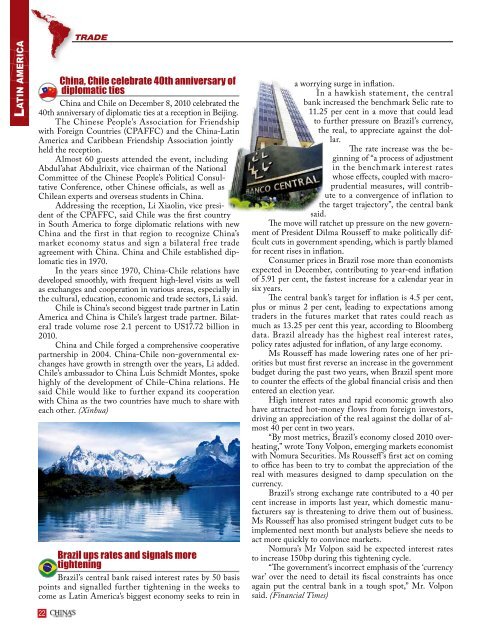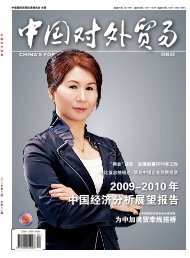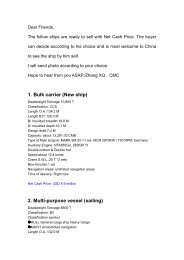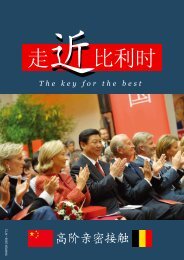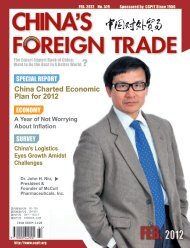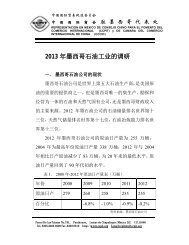Create successful ePaper yourself
Turn your PDF publications into a flip-book with our unique Google optimized e-Paper software.
<strong>TRADE</strong><br />
China, Chile celebrate 40th anniversary of<br />
diplomatic ties<br />
China and Chile on December 8, 2010 celebrated the<br />
40th anniversary of diplomatic ties at a reception in Beijing.<br />
The Chinese People’s Association for Friendship<br />
with Foreign Countries (CPAFFC) and the China-Latin<br />
America and Caribbean Friendship Association jointly<br />
held the reception.<br />
Almost 60 guests attended the event, including<br />
Abdul’ahat Abdulrixit, vice chairman of the National<br />
Committee of the Chinese People’s Political Consultative<br />
Conference, other Chinese officials, as well as<br />
Chilean experts and overseas students in China.<br />
Addressing the reception, Li Xiaolin, vice president<br />
of the CPAFFC, said Chile was the first country<br />
in South America to forge diplomatic relations with new<br />
China and the first in that region to recognize China’s<br />
market economy status and sign a bilateral free trade<br />
agreement with China. China and Chile established diplomatic<br />
ties in 1970.<br />
In the years since 1970, China-Chile relations have<br />
developed smoothly, with frequent high-level visits as well<br />
as exchanges and cooperation in various areas, especially in<br />
the cultural, education, economic and trade sectors, Li said.<br />
Chile is China’s second biggest trade partner in Latin<br />
America and China is Chile’s largest trade partner. Bilateral<br />
trade volume rose 2.1 percent to US17.72 billion in<br />
2010.<br />
China and Chile forged a comprehensive cooperative<br />
partnership in 2004. China-Chile non-governmental exchanges<br />
have growth in strength over the years, Li added.<br />
Chile’s ambassador to China Luis Schmidt Montes, spoke<br />
highly of the development of Chile-China relations. He<br />
said Chile would like to further expand its cooperation<br />
with China as the two countries have much to share with<br />
each other. (Xinhua)<br />
Brazil ups rates and signals more<br />
tightening<br />
Brazil’s central bank raised interest rates by 50 basis<br />
points and signalled further tightening in the weeks to<br />
come as Latin America’s biggest economy seeks to rein in<br />
a worrying surge in inflation.<br />
In a hawkish statement, the central<br />
bank increased the benchmark Selic rate to<br />
11.25 per cent in a move that could lead<br />
to further pressure on Brazil’s currency,<br />
the real, to appreciate against the dollar.<br />
The rate increase was the beginning<br />
of “a process of adjustment<br />
in the benchmark interest rates<br />
whose effects, coupled with macroprudential<br />
measures, will contribute<br />
to a convergence of inflation to<br />
the target trajectory”, the central bank<br />
said.<br />
The move will ratchet up pressure on the new government<br />
of President Dilma Rousseff to make politically difficult<br />
cuts in government spending, which is partly blamed<br />
for recent rises in inflation.<br />
Consumer prices in Brazil rose more than economists<br />
expected in December, contributing to year-end inflation<br />
of 5.91 per cent, the fastest increase for a calendar year in<br />
six years.<br />
The central bank’s target for inflation is 4.5 per cent,<br />
plus or minus 2 per cent, leading to expectations among<br />
traders in the futures market that rates could reach as<br />
much as 13.25 per cent this year, according to Bloomberg<br />
data. Brazil already has the highest real interest rates,<br />
policy rates adjusted for inflation, of any large economy.<br />
Ms Rousseff has made lowering rates one of her priorities<br />
but must first reverse an increase in the government<br />
budget during the past two years, when Brazil spent more<br />
to counter the effects of the global financial crisis and then<br />
entered an election year.<br />
High interest rates and rapid economic growth also<br />
have attracted hot-money flows from foreign investors,<br />
driving an appreciation of the real against the dollar of almost<br />
40 per cent in two years.<br />
“By most metrics, Brazil’s economy closed 2010 overheating,”<br />
wrote Tony Volpon, emerging markets economist<br />
with Nomura Securities. Ms Rousseff’s first act on coming<br />
to office has been to try to combat the appreciation of the<br />
real with measures designed to damp speculation on the<br />
currency.<br />
Brazil’s strong exchange rate contributed to a 40 per<br />
cent increase in imports last year, which domestic manufacturers<br />
say is threatening to drive them out of business.<br />
Ms Rousseff has also promised stringent budget cuts to be<br />
implemented next month but analysts believe she needs to<br />
act more quickly to convince markets.<br />
Nomura’s Mr Volpon said he expected interest rates<br />
to increase 150bp during this tightening cycle.<br />
“The government’s incorrect emphasis of the ‘currency<br />
war’ over the need to detail its fiscal constraints has once<br />
again put the central bank in a tough spot,” Mr. Volpon<br />
said. (Financial Times)<br />
22


